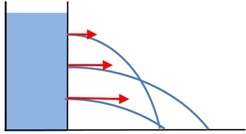Assignment:
Complete the following exercises.
1. Rank the following in terms of increasing density:
A. A100 g object with a volume of 25 cubic centimeters
B. A 200 g object with a volume of 100 cubic centimeters
C. A 100 g object with a volume of 100 cubic centimeters
D. A 400 g object with a volume of 50 cubic centimeters
2. Rank the following in terms of increasing pressure:
A. A 10 kg object distributed on a square surface with dimensions 10 cm by 10 cm
B. A 20 kg object distributed on a square surface with dimensions 10 cm by 10 cm
C. A 30 kg object distributed on a square surface with dimensions 20 cm by 20 cm
D. A 40 kg object distributed on a square surface with dimensions 30 cm by 30 cm
3. Consider four blocks with identical volumes placed in water as shown below. Which block has the smallest buoyant force on the water and why?

4. Consider four blocks with identical volumes placed in water as shown below. Rank the blocks in terms of increasing density:

5. Consider a tall container filled with water. There are three holes of equal size in the side of the container as shown on the diagram below. The red arrows indicate the velocity of the water as it flows out of the holes.

Why is the velocity larger for the bottom stream of water?
6. On a quiet day, the atmospheric pressure results in a force of about 10,0000 N on a window pane with an area of 1 square meter.
a. Why does this large force not shatter the window?
b. How will this change if a strong wind is blowing across the window pane?
7. Explain why locations near a large body of water generally have higher average temperatures in the winter and lower average temperatures in the summer.
8. A mirror cleaned with an alcohol solution is slightly colder right after it is cleaned. Why?
9. To keep the canned food from freezing in a storage cellar, a farmer places a tub of water in the cellar. Explain.
10. Why is it safe to stick your tongue on a wooden pole on a cold winter day, but not on a metal pole?
11. You are in the frozen food section of the grocery store and you notice that your hand gets cold when you place it on the glass windows of the display cases. Your friend says this is because coolness is transferred from the display case to your hand. What do you think?
12. Why are good conductors of electricity usually also good conductors of heat?
13. Why is it cooler to wear a white shirt than a black shirt on a hot, sunny day?
14. On a hot day in your hot kitchen, you decide to work with the refrigerator door open in an attempt to have the refrigerator cool the room. Which of the following best describes the result of this decision? Explain your answer.
A. It will cool the room very effectively
B. It will cool the room, but inefficiently
C. It will not change anything
D. It will actually warm the room
The remaining questions are multiple-choice questions:
15. Consider standing on a bathroom scale. How will the reading of the scale compare if you stand on one leg instead of two?
A. It will show less
B. It will show more
C. It will show the same
16. Consider standing on a bathroom scale. What does a bathroom scale show?
A. Mass
B. Density
C. Force
D. Pressure
17. Which has the greater density, a lake full of water or a cup full of lake water?
A. The water in the cup
B. The water in the lake
C. Both have the same density
18. The largest extremes in temperature are usually experienced _____.
A. On islands
B. In japan
C. In coastal cities such as boston
D. In the middle of the continents
E. Near the oceans
19. The fact that desert sand is very hot in the day and very cold at night is evidence that sand has a _____.
A. High specific heat
B. High density
C. Low specific heat
D. Low density
20. Which of the following has the highest specific heat?
A. Water
B. Wood
C. Rock
D. Concrete
21. What happens to the volume of a 1 kg of water when it is heated from 0oC to 2oC?
A. Increases
B. Decreases
C. Stays the same
22. What happens to the volume of a 1 kg of water when it is heated from 4oC to 6oC?
A. Increases
B. Decreases
C. Stays the same
23. Heat transfer by conduction in metals occurs when:
A. Atoms give off energy in the form of radiation
B. A large number of atoms move from one place to another
C. Electrons collide with other electrons and with atoms.
D. Electromagnetic waves travel though space to heat up an object.
24. Heat transfer by convection occurs when:
A. Atoms give off energy in the form of radiation
B. A large number of atoms move from one place to another
C. Electrons collide with other electrons and with atoms.
D. Electromagnetic waves travel though space to heat up an object.
25. What produces the cooling effect inside a refrigerator?
A. A compression making the refrigeration gas condense to a liquid.
B. An electric motor turning electrical energy into thermal energy.
C. Excellent insulation.
D. The evaporation of the refrigeration liquid.